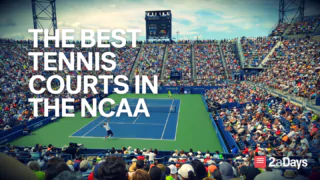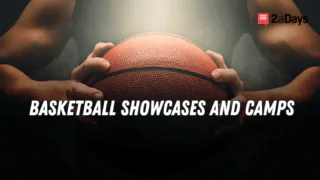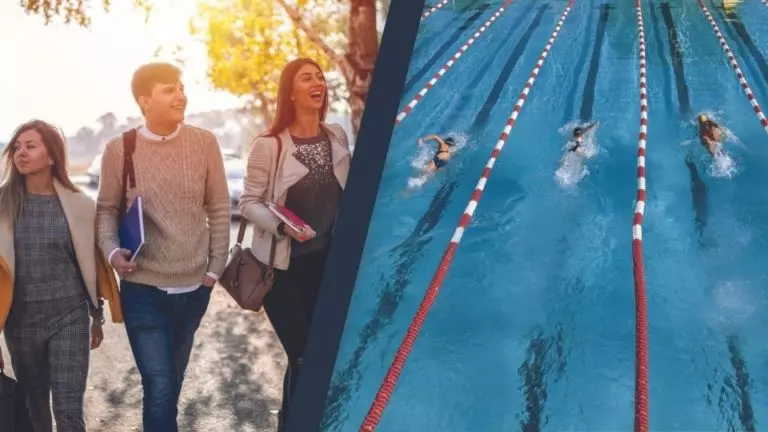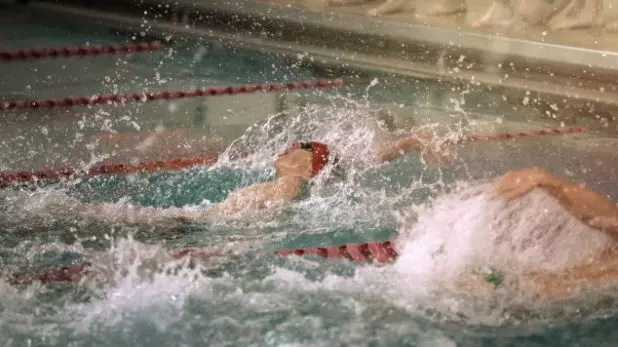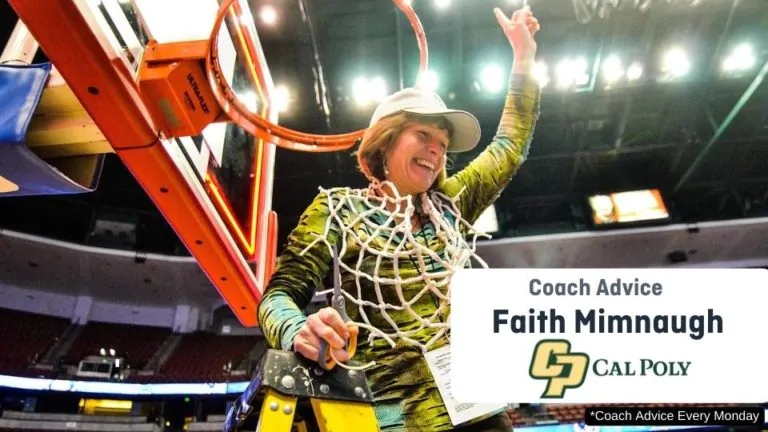Noah Rubin, age 23, is from New York, NY, and is an American tennis player. Rubin had his eyes locked in on the pros from a young age. For high school, he attended the John F. Kennedy High School for one year and completed his high school degree at Laurel Springs School, an accredited online private school. From there, he went to Wake Forest University, but his decision to take his talents there was not easy. He was named ACC Player and Freshman of the Year honors while attending Wake Forest. After one year of college, he turned pro and has since won four ATP Challenger titles and is ranked 170 Nationally.
Since turning pro in 2015, he has won four ATP Challenger titles and has been steadily ranked just inside or just outside the Top 200 in singles.
Outside of professional tennis, he runs the Instagram account @behindtheraquet that allows tennis players to be transparent about the struggles they face beyond the court.
2aDays: What are three qualities that you feel high school athletes need to possess to be a great college athlete?
I think the most important aspects are, one, having self-esteem and knowing your worth, that's really difficult, especially in high school. Many kids have problems with self-confidence but understand how hard you work and what you deserve. That way, you don't get taken advantage of in the transition from high school to college. I would also say independence and maturity. It's nice to have the help of other people throughout the process, but if you have this minimum stage of independence, it'll allow you to flourish on your own and then allow other people to fully help you out. Without independence, it's going to be hard for you to thrive on your own.
I also think openness and understanding of how you want things to go down. Life isn't always as it seems, especially as a high school kid, you think you have the whole world open to you, and that's not always the case. You have to maneuver and have an open mind to everything.
2aDays: What advice can you give to high school athletes who are going on official visits? What are some dos and don'ts?
I think for official visits, it's really important to have your priorities in order. Basically, make a list of three to five big positives that you need to see in a school and a few negatives that no matter what happens, you really don't see yourself in that situation. Have that list next to you at all times, and I think it'll help you make very clear-cut decisions since it gets really tricky. A lot of schools out there are very similar, and a lot of schools will tell you that they are the school for you, so I think you have to have an understanding of what you want in a school and what you can't have.
2aDays: Back when you were still in high school, what was the most significant factor in your decision to play at Wake Forest University? What made you choose the Wake Forest?
It was a very difficult decision. Hopefully, this doesn't come off too arrogant, but I basically had a choice at any school I wanted to. The Ivy Leagues would've been tougher, I would've had to take a couple of extra courses, but I, fortunately, could get into any school. I had to decide on my own where I was more comfortable. I didn't want to go to the West Coast, so I figured out geographically where I wanted to be first. From there on, I was looking at the coaches and hearing people's advice from people that I trusted. It was weird for me at the time to go to a school that was ranked 30th in the country when I had the option to go to the number one school in the country, which was UVA at the time. Those were my final two, UVA and Wake Forest. At Wake Forest, I just really trusted the coaches and also, I really wanted the spotlight and really wanted to make a difference in the school and the program for years to come. Thankfully that's what I did. Now Wake Forest is number one in the country, and hopefully, I grew a little bit of a legacy there. It was an incredible time there, and It was not an easy decision to make, to say the least.
2aDays: Should high school athletes reach out to a coach through social media? Moreover, if so, how?
I see a lot of people say it's just not the professional route, but our system is based around social media. I think if you have an email and you have direct contact with the coach, you should go for it straight off the bat. However, if emails aren't working, I think social media is okay. That's just how we communicate nowadays. When I was getting recruited, I was getting messages on all platforms, because it was legal at the time, and I don't think anything is wrong with it. I do think to send an email to start the way to go, and if it's not working and you maneuver to social media, I don't think it's a problem at all. It's just our generation.
2aDays: What was the most challenging part of the recruiting process for you? What would you do differently?
I'm not sure. I think what a lot of kids have to understand is that you have to make the decision for yourself. It can't be for your parents; it can't be for your high school coaches, it can't be for anyone else. If you're super excited to go to a school that made a great impression on you, if you're excited to be there and you feel success in your future, then just do it. I think even though I didn't succumb to the outside pressure of what everyone else was saying, it was still draining on me. I was hearing from all sides, they were saying, “I can't believe you're not going to UVA or UCLA or one of the top schools,” but in my heart, I just didn't think I was going there. I would tell myself to, just block it all out; don't listen to another word. Go to a place where you think you'll smile the most, that's about it.
2aDays: What is the best advice that you can give high school athletes who are looking to play at the collegiate level?
Be open-minded. I know this is contradicting the last answer, but while you don't listen to other people's opinions, you have to be open to what everyone else says and siphon out all of the grey information because if you think you know everything, that's the least appealing thing to a college coach. If you can open up and be open-minded and take in every piece of information, and then you siphon out what you think is unnecessary. It'll just enable yourself to learn and better yourself every day because there are many barriers in the way and you have to learn and manage and get through it, but that will come, but it's essential to stay open-minded and have that willingness to keep improving.
2aDays: You were able to end your freshman year at Wake Forest ranked number five in the nation. What is one tip that you could give athletes who are playing in high stressful matches?
There's still no final answer here because I'm still going through them myself. I've been around enough players who regretted not giving it their all. No matter the pressure, the situation no matter the circumstances of people who don't like how you're playing, give it your all: each and every point, each and every match, each and every game. Regardless of the outcome, no one can fault you for trying your best. You can put your head down at the end of the night and be upset, but you'll never feel that sense of regret. Then you're on a team, and you're playing for more than yourself now. Every time you step on the court and wear your school colors, you have to understand that you're not playing for yourself, or your coach, you're playing for your school, and you have to abide by that.
2aDays: What advice can you give to college athletes who are looking to go pro? What is the first step in the process that they should take?
I know it may be a little different for tennis, but it's more along the lines of being grounded. I was one of the best college athletes at the time, and it wasn't a smooth transition for me. For many college athletes, they think that the minimal success at the collegiate level means they'll fly right through and rank at the top 200 in the world, and that is not the case. There is a whole other beast. As difficult as it was to go from an individual to a team, it's even tougher to transition from a team back to an individual where nobody cares about you. You're on your own, and you have to pay for everything for yourself, nothing is taken care of for you, it becomes tough. It's something people need to understand that it is not a smooth transition. You go from the center of your little world to a nobody, and that's something you need to manage.
The first step in the process is finding a base, where you feel comfortable and happy. Where you're able to get the best training in your head, and the best mindset for you to compete at the professional level, whether it be finding a training academy, a coach or a group of guys, always have a base. When you go from the collegiate level where you know everything is taken care of, you know where you're practicing, and you know whom you're hitting with. When you go pro, you don't know anything like that unless you're at the federation where they take care of it. Most people have to find their base to train. I think getting that consistency is essential.
2aDays: What was the best piece of advice that a coach has given you, and who was that coach?
If I'm not enjoying myself, I should leave the court. I've gotten that from a few people; my father, and some other coaches. The day that you stop having the joy for just practicing, competing, doing this for a living, is the day you should stop and do something else, and then reevaluate your goals and priorities.
Very early on in my career, I had to overcome all the boundaries that come with entering a professional sport. There are all of these intricate and tough moments throughout a career. If you're not smiling through the process and only enjoying the winning, which happens very few times throughout the year, it'll be tough. Keeping that smile on your face throughout the process is most important.
2aDays: What advice can you give to an athlete who is looking to get off the bench?
I think this relates to life as well, but I think you have to make yourself needed. Nobody owes anyone anything, but you have to force yourself to be seen. Do whatever it is. If you're not playing great tennis, get into incredible shape. I think most people get deterred when they're not competing and not getting enough minutes. I think if that's who you're going to be, that's fine, but realize that nothing is given. Just because you played in high school doesn't mean you should play in college. Make a name for yourself and find a way to do it. Knockdown walls and the rest will come. Put in an insane effort to become an indispensable part of the team. Pave your path because no one knows your past.
2aDays: If an athlete is not getting along with a coach, what advice can you give them?
Playing time is one thing because that's up to the discretion of the coach. No matter what the situation is, people overcomplicate things a lot, and I know things do become complicated, but have a sit-down talk with your coach. Man to man, woman to woman, talk to them and see where their head is at. See what they're going through and where their heads at. If they're rational people and you get some answers that'll be truly beneficial. If after that talk you're not gaining any ground, there are times where you have to transfer schools out of necessity. If you realize after a couple of talks that this may not work out and you may not get the best out of the situation, find another way to get to your goal.
2aDays: As athletes, we might always get along with our teammates, what advice can you give to athletes who are having a tough time with a cranky teammate?
My thing was… as a freshman; if I took the first position over a guy who was a junior at the time, and he didn't like it. However, I did tell him that I was not trying to take anything away from him. I found out early on that he didn't have aspirations to go pro and I did. I thought this was a perfect scenario. We're fighting for the same thing. I think a lot of things are blown out of proportion. I think if you have a talk with most people and look them in the eye and tell them, this is the issue and how do we get past this, most people get through it, have a simple conversation.
2aDays: If you could go back, what would you do in college that you wish you spent more time doing?
I wish I enjoyed the moment a little more. I didn't spend much time in college because it was only a year for me, but many people underestimate how fast time goes, and how much time there is after school. I was trying to get to the pros as quickly as possible, but now that I'm here, I have so much time. I wish I enjoyed that year a little bit more and didn't worry about the professional path as much. For the most part, you won't get that college atmosphere ever again because it is so unique. I think you have to enjoy that moment and don't rush your professional goals.
Fun Questions:
2aDays: Had you not gone pro; what do you think you'd be doing?
I have a lot of interests in the realm of what I enjoy doing. I think I would be doing a broadcast commentator or something in photojournalism. I love the sport of tennis, but I see it dying out a little bit, and there are some real problems. I think this Instagram account [behind the racquet] would allow fans to see the real side of a tennis player and what goes on inside our mind, who they are as people, and the issues they deal with. It allows people to relate to them, and I think it's bringing a new side to the world of tennis and bringing new interests.
2aDays: What is the funniest thing that happened to you on the court?
Last year, during the biggest win in my career. I was playing against John Isner. I got three drop shots in a row, and then my shoe fell apart in front of many people. I didn't even know if I had another pair of shoes in my locker. My shoe broke in half, and it's something I'll remember forever.
* Originally published on October 28, 2019, by Erin Moy


